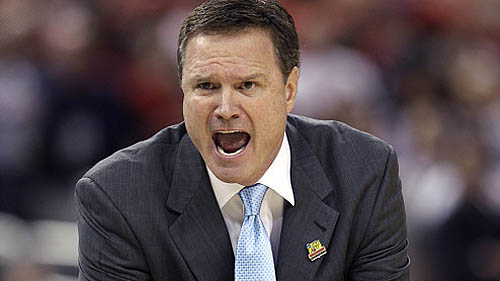NCAA Still Cleaning Up Last Season’s Misconduct
Posted by Chris Johnson on June 27th, 2013Chris Johnson is an RTC Columnist. He can be reached @ChrisDJohnsonn.
So much ridicule and scorn has been shoveled on top of the NCAA in recent months that it almost feels redundant to criticize at this point – like a Ferrari-wielding millionaire challenging his Prius-owning cousin to a street race, or the O’Doyle family ribbing Billy Madison through grade school, or USC fans simmering over Wednesday’s news of the congratulatory back slap Oregon received for illegal payments to a recruiting handler. The harsh tones of NCAA critiques have coursed through every contingent of college sports media at one phase or another this offseason, and today, after going down that path on several occasions myself, I’m just not feeling up to it. Sorry.

The punishments handed down to Self and Marshall will be forgotten by the start of the season (AP Photo).
But if you got me in the mood, I might be able to talk about how profoundly funny it was Wednesday to learn the NCAA had issued a public reprimand of Bill Self for a scoring table fist palm during Kansas’s third-round NCAA Tournament match-up with North Carolina that was so destructive he needed to be reminded of his unseemly game behavior three months after the fact. I can picture Self now, watching Andrew Wiggins do ridiculous free-throw line dunks from a comfortable lounge chair, smarting in the Kansas basketball offices while counting his nine Big 12 championship rings. “Ouch, that really hurt!” Self’s sideline demeanor was too publicly unbecoming – because coaches showing emotion during a game is a really bad thing; the NCAA says it, and so it shall be – and too tawdry for a coach who, by all accounts, is one of the purest and most morally pure sideline presences not just in college basketball, but any college sport.
Punishing Self is a palatable concept if you look at it that way – that a stately figure presiding over one of the nation’s most revered programs should know better than to identify himself as an brazenly dramatic sideshow. And maybe Marshall Henderson’s “inappropriate gesture towards the crowd” during Ole Miss’s round-of-32 game against La Salle crossed the line, just as Wichita State associate athletics director Darron Boatright’s confrontation with security was excessively combative and – let’s be honest – something the NCAA Tournament could probably run more smoothly without.
All three of those individuals were notified of public castigations Wednesday in terse statements released by the NCAA, and to be perfectly honest, other than maybe Boatright – who I don’t know personally, or have any knowledge of whatever led to his purported confrontation with security guards at a basketball tournament – I’m willing to bet neither Self nor Henderson paid yesterday’s news anything more than one, big, apathetic yawn. Self is a Hall of Fame-in-waiting coach enjoying one of the best offseasons in recent KU hoops history – which is saying a lot, when you try to grasp the fact that he has slipped a new conference championship ring onto one of his fingers every offseason for the past nine years. He’ll have all of his digits accessorized 12 months from now. (Yes, that was a prediction.)
And if Self isn’t going to get worked up over a teensy NCAA censure all but guaranteed to recede into the dark June memory banks of a long college hoops offseason, Henderson is just as likely to nod, look away and continue the raucous behavior that landed him this minor NCAA nick in the first place. Issuing these punishments now essentially dissolves the immediacy of the violation, and the corresponding import a swiftly-delivered punishment could affect on a given player or coach’s on-court conduct. The NCAA is slow and frustratingly bureaucratic and understaffed, and issuing fair punishments is more important than issuing hastily misguided ones, but shelving punitive action this long eliminates the biggest disincentive immediate punishment has to offer. When players and coaches understand their wrongful behavior will be met with promptly delivered punishments, no matter how meager, the cost-benefit analysis is well understood and well-respected. The buffer of a months-long waiting period is eliminated. Players and coaches know their behavior is being closely monitored and expediently reproved. The system works better this way.
Three months after three minor incidents occured, the NCAA’s punishment can’t be labeled so narrowly. What the NCAA did Wednesday didn’t involve punishment; it’s much simpler than that. It reminded a coach, a player and an associate athletic director that their minor altercations actually happened, with a stern disciplinary shove thrown in for good measure.
I broke my promise. Sorry.












































